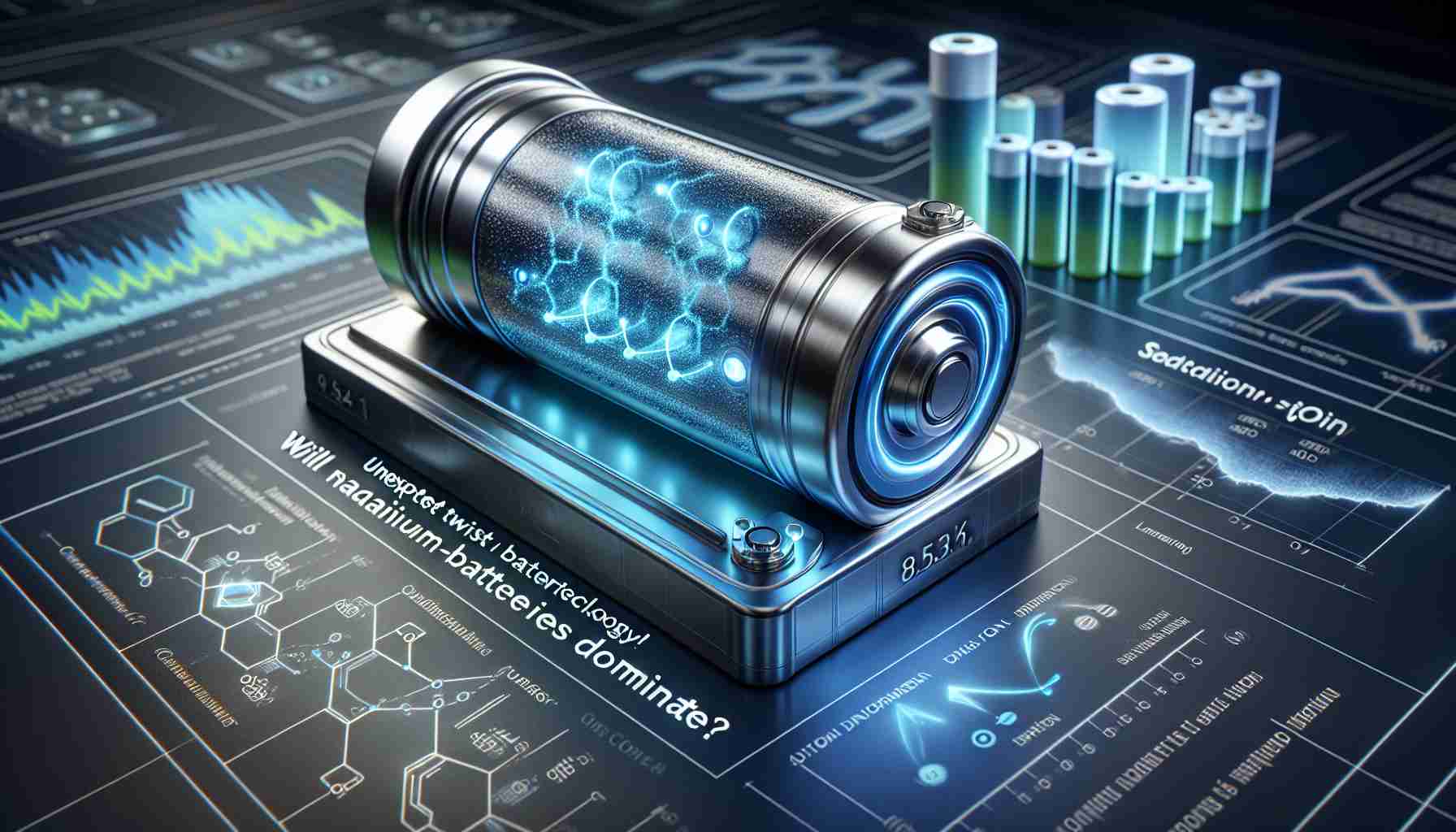The Future of Battery Technology Lies Beyond Lithium
In an intriguing shift within the energy sector, the U.S. Department of Energy has unveiled a bold initiative set to redefine the landscape of battery technology. Introducing the LENS Consortium, a venture valued at $50 million, which places sodium-ion batteries at the forefront of innovation. Led by Argonne National Laboratory and accompanied by other esteemed research institutions, this effort seeks to harness widely available materials, moving away from reliance on expensive and rare elements like lithium, cobalt, and nickel.
Sodium-Ion: Beyond Just Power Storage
Sodium-ion batteries represent a step forward in achieving sustainable battery solutions. Although they do not match the energy density found in lithium-ion batteries, their cost-effectiveness and sustainability are hard to ignore. This initiative is poised to not only enhance domestic supply chain capabilities but also revolutionize energy solutions for electric vehicles and renewable storage. Transitioning to such technology could significantly diminish dependence on rare material imports.
Shaping the Future of Wireless Charging
In a parallel pursuit, industry giants InductEV and ENRX are pioneering global standards for wireless EV charging. Their focus on high-power systems has the potential to redefine convenience for electric vehicle users by easing range anxiety and promoting wireless technology. By setting industry standards and ensuring interoperability, these advances are set to transform how vehicles are powered.
AMPECO: Charging Towards Global Dominance
Meanwhile, AMPECO has secured $26 million in Series B funding, positioning itself as a dominant force in the EV charging market. Established in 2019, AMPECO has rapidly expanded, supporting more than 160 clients and connecting over 120,000 charging stations globally. This funding aims at scaling operations across major global markets.
As these developments unfold, the energy and automotive industries stand on the brink of an era marked by innovation and strategic growth.
The Ripple Effects of Advancing Battery Technology
The latest initiative by the U.S. Department of Energy marks a transformative phase in battery technology, signaling a shift from the traditional reliance on lithium-ion systems to exploring the potential of sodium-ion batteries. This change is not just a technological revolution but a move with profound implications for the environment, economy, and humanity.
Environmental Impact
Sodium-ion batteries are crafted from abundantly available materials, unlike their lithium counterparts, which depend on rare and environmentally taxing elements like cobalt and nickel. The extraction processes for these metals often result in significant ecological damage, including water pollution, habitat destruction, and greenhouse gas emissions. Transitioning to sodium-based solutions could thus markedly reduce the environmental footprint of energy storage. By decreasing reliance on mining these scarce materials, we lower the stress on ecosystems and contribute to conservation efforts.
Economic and Supply Chain Benefits
On the economic front, sodium-ion batteries promise cost-effectiveness that could reshape energy affordability. The move away from scarce resources will enhance energy security by reducing dependence on foreign imports of lithium, cobalt, and nickel, all of which are subject to geopolitical tensions and price volatility. This domestic focus not only stabilizes supply chains but opens avenues for economic growth through the creation of new industries and jobs related to sodium-ion battery production and distribution.
Implications for Humanity and Future Innovations
For humanity, the push towards sodium-ion technology reflects a broader commitment to sustainability and resource equity. As the world edges closer to an electric vehicle future and renewable energy proliferation, having a battery solution that aligns with these goals is pivotal. Affordable, sustainable storage technologies enable wider access to clean energy, making renewables more viable on a global scale.
Furthermore, the efforts to standardize wireless EV charging portend a future where convenience enhances the adoption of electric vehicles. Reducing range anxiety and ensuring interoperability across manufacturers can accelerate the shift from internal combustion engines, drastically cutting carbon emissions and fostering an environment where sustainable living becomes mainstream.
In looking ahead, initiatives like these suggest a world where energy storage is not a limiting factor but rather a catalyst for innovation. The shift to sodium-ion batteries and advancements in charging technology pave the way towards an electrified economy, capable of supporting the nuanced energy needs of the future. By embracing such technologies now, we set a precedent for responsible innovation that aligns human progression with planetary health, thus ensuring a sustainable future for subsequent generations.
The Shift to Sodium-Ion Batteries: A New Era in Energy Solutions
The unveiling of the LENS Consortium by the U.S. Department of Energy marks a significant pivot in the quest for sustainable battery technology. This $50 million initiative highlights the exploration of sodium-ion batteries, offering a promising alternative to traditional lithium-ion batteries. With the backing of Argonne National Laboratory and other research institutions, the focus is on harnessing abundant materials and reducing dependence on scarce resources like lithium, cobalt, and nickel.
Innovations and Sustainability in Sodium-Ion Batteries
One of the most remarkable aspects of sodium-ion batteries is their potential to provide a cost-effective and environmentally friendly alternative to existing battery technologies. Although they trail behind lithium-ion options in terms of energy density, their ability to utilize abundant materials could lead to more sustainable production processes. This approach not only aims to secure domestic supply chains but also supports the global transition towards eco-friendly energy solutions, including applications in electric vehicles and renewable energy storage.
Wireless Charging: A New Frontier in EV Innovation
The efforts of InductEV and ENRX to pioneer global standards for wireless electric vehicle (EV) charging signify a groundbreaking leap in EV technology. By focusing on the development of high-power wireless systems, these companies intend to alleviate range anxiety and make EV ownership more convenient. Establishing industry standards and ensuring interoperability are key to facilitating widespread adoption, ultimately enhancing the efficiency and ease of charging car batteries.
AMPECO’s Charge for Global Expansion
AMPECO’s recent acquisition of $26 million in Series B funding reflects its ambition to solidify its presence in the EV charging infrastructure industry. The company’s meteoric rise since its inception in 2019 has led to their support of over 160 clients and the connection of more than 120,000 charging stations worldwide. The newly acquired capital is set to propel AMPECO’s growth in major global markets, reinforcing its role as a leader in the EV charging space.
Pros and Cons of Sodium-Ion Batteries
Pros:
– Utilization of abundant and affordable materials like sodium.
– Reduction in the need for rare materials such as lithium, cobalt, and nickel.
– Potential for establishing a sustainable and secure supply chain.
Cons:
– Lower energy density compared to lithium-ion batteries.
– Still in development, with commercial viability yet to be fully realized.
Market Predictions and Future Trends
As sodium-ion technology progresses, it is predicted that these batteries could become a staple in various applications beyond EVs, including grid storage and portable electronics. The focus on sustainability and cost-effectiveness aligns with global trends towards green technology and renewable energy solutions.
The evolving landscape of battery technology, alongside advancements in wireless charging and the expansion of EV infrastructure, underlines a future defined by innovative and strategic energy solutions. These initiatives collectively embody a significant shift towards a more sustainable and efficient energy framework.
For more insights into battery innovation, visit batteries innovation.







